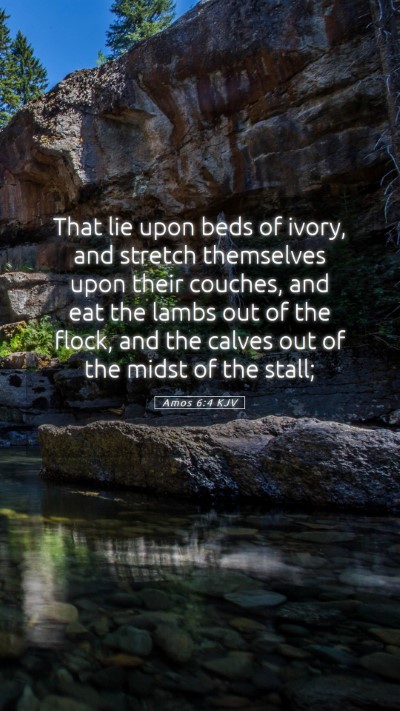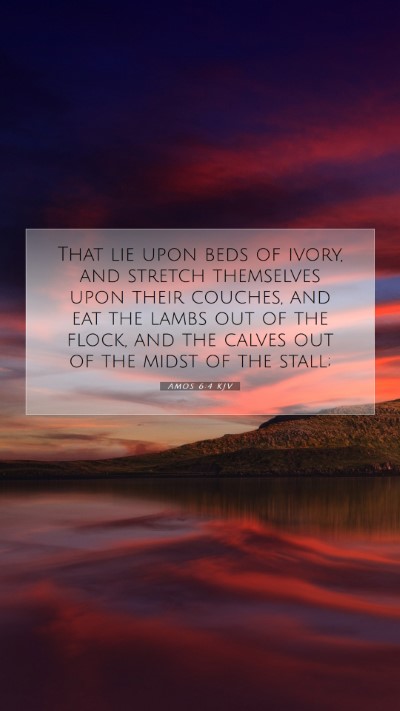Old Testament
Genesis Exodus Leviticus Numbers Deuteronomy Joshua Judges Ruth 1 Samuel 2 Samuel 1 Kings 2 Kings 1 Chronicles 2 Chronicles Ezra Nehemiah Esther Job Psalms Proverbs Ecclesiastes Song of Solomon Isaiah Jeremiah Lamentations Ezekiel Daniel Hosea Joel Amos Obadiah Jonah Micah Nahum Habakkuk Zephaniah Haggai Zechariah MalachiAmos 6:4 Meaning
What is the meaning of Amos 6:4?
That lie upon beds of ivory, and stretch themselves upon their couches, and eat the lambs out of the flock, and the calves out of the midst of the stall;
Amos 6:4 Bible Verse Meaning
Bible Verse Commentary: Amos 6:4
Understanding Scripture: Amos 6:4 reads, "Woe to those who are at ease in Zion, and to those who feel secure on the mountain of Samaria." This verse serves as a powerful admonition to the complacent and self-satisfied among the Israelites, expressing God's disdain for their false sense of security.
Contextual Background: In the context of the Book of Amos, written in a time of prosperity for Israel, the prophet confronts the people for their exploitation of the poor and their detachment from God amidst material wealth.
- Matthew Henry's Commentary Insight:
Matthew Henry emphasizes the danger of comfort without accountability. He remarks on the folly of being at ease while the nation faces impending judgment. Henry urges readers to reflect on the spiritual state of their hearts over their material state.
- Albert Barnes' Interpretation:
Albert Barnes highlights the metaphor of 'Zion' and 'Samaria'—centers of worship and power—which illustrates the irony of their situation. While they should be a beacon of faith, they have instead become symbols of spiritual slumber.
- Adam Clarke's Exegesis:
Adam Clarke points out that the people were lulled into a false sense of peace and prosperity. He interprets this verse as a warning against overconfidence in external circumstances, reminding readers of the need for genuine devotion to God.
Key Themes and Applications
This verse encompasses vital themes such as:
- Complacency: The Israelites’ ease brings about a spiritual numbness that blinds them to their own moral and spiritual failings.
- False Security: The false sense of security rooted in material blessings is challenged; spiritual integrity is paramount.
- Prophetic Warnings: The call to awake from slumber and recognize impending judgment is both historical and applicable to contemporary believers.
Cross-References:
- Isaiah 32:9: A call to rise up from complacency.
- Zephaniah 1:12: The Lord’s examination of the complacent.
- Luke 17:26-30: As in the days of Noah, so will it be in the days of the Son of Man, emphasizing heedlessness.
- Revelation 3:17: "You say, ‘I am rich; I have acquired wealth and do not need a thing.’ But you do not realize that you are wretched, pitiful, poor, blind, and naked."
Applying the Insights
For modern readers and Bible study groups, Amos 6:4 serves as a profound reminder to:
- Engage in biblical exegesis—understand beyond the surface.
- Utilize Bible study tools to dive deep into the interpretations and applications of scriptural teachings.
- Reflect on personal spirituality and Bible study lessons that promote active engagement with faith.
Final Thoughts
In summary, Amos 6:4 is a call to awaken from spiritual complacency. It holds timeless relevance, urging believers to examine their lives and prioritize their relationship with God over material comforts, thus integrating the meanings of Bible verses deeply into their daily lives.
Keywords for Further Study: Bible verse meanings, Bible verse interpretations, Bible verse explanations, Bible verse commentary, Scripture analysis, Biblical exegesis, Bible study insights, Understanding Scripture.


